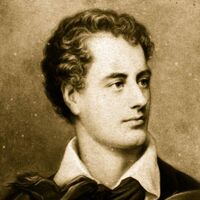From the French
ÃGLE, beauty and poet, has two little crimes;
She makes her own face, and does not make her rhymes.
Other works by Lord Byron...
Answer to Some Elegant Verses Sent by a Friend to the Author, Complaining That One of His Descriptions Was Rather Too Warmly Drawn
‘But if any old lady, knight, prie… Should condemn me for printing a s… If good Madam Squintum my work sh… May I venture to give her a smack… CANDOUR compels me, BECHER!…

